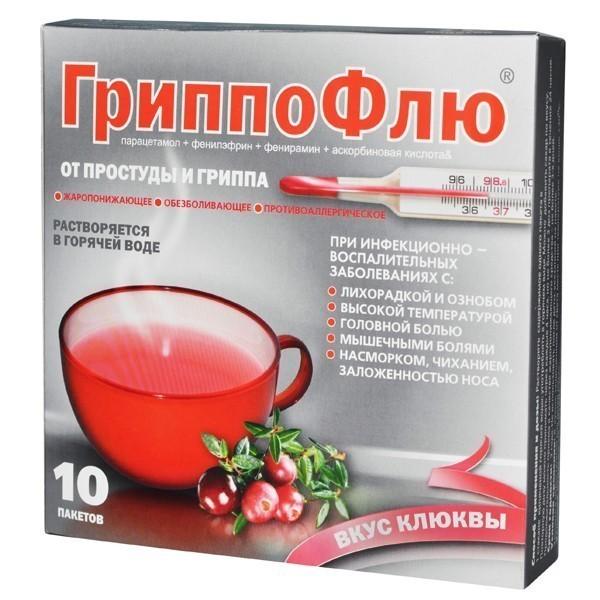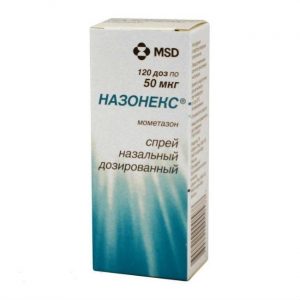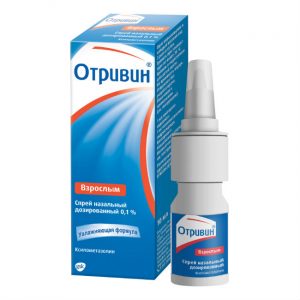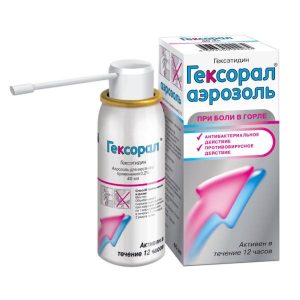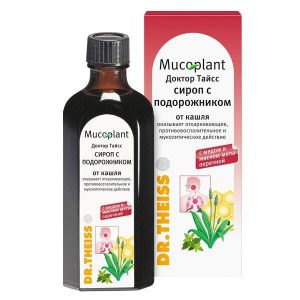Description
Release form
FluFlu. Powder for oral solution.
Packaging
In a package of combined material 13 g in a carton pack of 10 bags.
Pharmacological action
Combined drug. Paracetamol is a non-narcotic analgesic that affects the centers of pain and thermoregulation. It has an analgesic and antipyretic effect. Reduces headaches and muscle aches, fever, softens sore throats.
Pheniramine – a blocker of H1-histamine receptors, an anti-allergic agent, reduces rhinorrhea and lacrimation, eliminates spastic phenomena.
Phenylephrine – an adrenergic agonist with moderate vasoconstrictor action, reduces nasal congestion and facilitates breathing through the nose.
Ascorbic acid – is involved in the regulation of redox processes, carbohydrate metabolism, blood coagulation, increases the body’s resistance to infections, reduces vascular permeability. Improves the tolerance of paracetamol and lengthens its effect.
Indications
Infectious and inflammatory diseases (SARS, influenza), accompanied by fever, chills and fever, headache, runny nose, stuffy nose, sneezing and muscle pain.
Contraindications
arterial hypertension
diabetes mellitus
closed-angle glaucoma
severe liver, kidney, heart, thyroid, lung and urinary asthma (including bladder
peptic ulcer of the stomach and duodenum
pancreatic disease
difficulty urinating with prostate adenoma
blood system disease
enzyme deficiency g yukoz-6-phosphate dehydrogenase
pregnancy and lactation
children under the age of 12 years
Hypersensitivity to the individual components of the preparation.
Precautions: Congenital hyperbilirubinemia (Gilbert syndromes, Dubin-Johnson and Rotor), prostatic hyperplasia.
Use during pregnancy and lactation
Contraindicated during pregnancy and lactation.
Composition
1 sachet contains: paracetamol 0.325 g, phenylephrine hydrochloride 0.010 g pheniramine maleate 0.020 g, ascorbic acid 0.050 g
Excipients: sugar, citric acid, sodium citrate dihydrate, Cranberry flavoring, 3-substituted calcium phosphate, titanium dioxide, quinoline yellow dye E-104, acid red 2C for pharmaceutical purposes.
Dosage and administration
Dissolve the contents of one packet in 1 cup of boiled hot water and use it hot. You can add sugar to taste. A repeated dose can be taken every 4 hours, but not more than 3 doses of the drug within 24 hours. The duration of admission as an antipyretic is not more than 3 days.
Side effects
Allergic reactions (skin rash, itching, urticaria, angioedema), nausea, epigastric pain, anemia, thrombocytopenia, agranulocytosis.
irritability, dizziness, increased blood pressure, palpitations, impaired falling asleep.
Increased intraocular pressure, dry mouth, urinary retention.
With prolonged use in large doses, hepatotoxic and nephrotoxic effects are possible (renal colic, glucosuria, oyster nephritis, papillary necrosis), hemolytic anemia, aplastic anemia, methemoglobinemia, pancytopenia.
Drug Interaction
Enhances the effects of monoamine oxidase inhibitors, sedatives, ethanol. Ethanol enhances the sedation of antihistamines.
Antidepressants, antiparkinsonian and antipsychotic drugs, phenothiazine derivatives increase the risk of urinary retention of dry mouth, constipation.
Glucocorticosteroids increase the risk of developing intraocular pressure.
Paracetamol reduces the effectiveness of uricosuric drugs and increases the effectiveness of indirect anticoagulants.
Tricyclic antidepressants increase sympathomimetic activity, and the simultaneous administration of halothane increases the risk of ventricular arrhythmia.
Reduces the hypotensive effect of guanethidine, which in turn enhances the alpha-adrenostimulating activity of phenylephrine.
Overdose
Symptoms (caused by paracetamol): paleness of the skin, decreased appetite, nausea, vomiting, hepatonecrosis. Toxic effect in adults is possible after taking more than 10-15 g of paracetamol, increased activity of “hepatic” transaminases, an increase in prothrombin time (12-48h after administration) a detailed clinical picture of liver damage manifests itself in 1-6 days. Rarely, liver failure develops rapidly and may be complicated by renal failure (tubular necrosis).
Treatment: administration of SH-group donors and precursors of glutathione-methionine synthesis 8-9 h after overdose and N-acetylcysteine after 12 hours. The need for additional therapeutic measures is determined by the concentration of paracetamol in the blood, as well as the time elapsed after his reception.
Storage conditions
In a dry, dark place at a temperature of no more than + 30 ° С.
Expiration
2 years. Do not use after the date specified on the package.
Deystvuyuschee substances
Paracetamol, phenylephrine, Pheniramine, Ascorbic acid
Possible product names srdl10p
INFLUENZA INFLUENZA and INFLUENZA 13.0 N10 / CRANBERRY /
Influenza from colds and flu p / r-ra d / vnutr 13g N10 pack cranberry
Influenza from colds and flu pore. d / prg. r-ra / cranberry / X10
GrippoFlu bags with cranberry flavor 13 g, 10 pcs.
Marbiopharm, Russia
